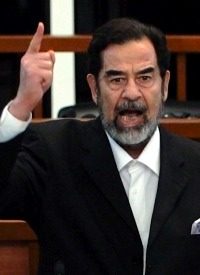
The documents, some 25 declassified interviews and informal conversations posted on the George Washington University website on July 1, also reveal that Hussein repeatedly denied a relationship with al-Qaeda that had been publicly alleged by the Bush administration.
Piro documented that “Hussein stated Iran was Iraq’s major threat due to their common border and believed Iran intended to annex Southern Iraq into Iran. The possibility of Iran trying to annex a portion of Southern Iraq was viewed by Hussein as the most significant threat facing Iraq.” Iran was and remains a prolific international sponsor of terrorism, and it currently wields heavy political influence in southern Iraq because of the heavy Shiite population. Hussein’s ruse of maintaining a weapons of mass destruction (WMD) program was designed to intimidate Iran, but it ended up spurring the United States into war against Hussein’s regime. President Bush cited Iraqi WMDs as the primary reason for seeking a congressional resolution authorizing war on Iraq. Hussein’s ruse either pulled the wool over the Bush administration’s eyes, or the Bush administration knowingly extended the ruse by fooling Congress and the American people into attacking Iraq.
Hussein also took aim at another key Bush administration claim used to justify the war against Iraq. The Bush administration claimed that Saddam Hussein was working with al-Qaeda. But Piro noted that “Hussein stated that Usama Bin Ladin’s ideology was no different than the many zealots that came before him. The two did not have the same belief or vision.” When Piro challenged Hussein on “evidence” publicly trumpeted by Bush administration officials like Vice President Cheney of a relationship between Iraq and al Qaeda, Hussein denied a relationship again. Piro persisted, quoting an Arabic saying that “the enemy of my enemy is my brother,” and Hussein said that “Hussein replied that the United States was not Iraq’s enemy, but that Hussein opposed its policies.” Hussein said that if he wanted to make common cause with the U.S.’s enemies, he would have allied with North Korea or China.
To date, no evidence of a working relationship between the former Iraqi regime and al-Qaeda has been revealed. The U.S. National Intelligence Estimate before the war stated that Hussein and al-Qaeda considered each other enemies. Even Bush administration stalwarts like former Vice President Dick Cheney have backed away from claims that Hussein’s government was providing assistance to al-Qaeda.
Piro noted that Hussein pointed out that al-Qaeda only declared jihad on the United State after the United States established military bases in Saudi Arabia, the Islamic holy lands, during the first war against Iraq. “Hussein stated that the United States used the 9/11 attack as a justification to attack Iraq. The United States had lost sight of the cause of 9/11.” It was a self-serving observation by Hussein, but there’s no denying its accuracy.
The George Washington University scholars who posted the FBI reports of the interviews with Hussein noted that the interviews shed very little light on how Washington policy-maker meddling had created the Saddam Hussein monster in the first place: “Not included in these FBI reports are issues of particular interest to students of Iraq’s complicated relationship with the U.S. — the reported role of the CIA in facilitating the Ba’ath party’s rise to power.”
Photo: AP Images



